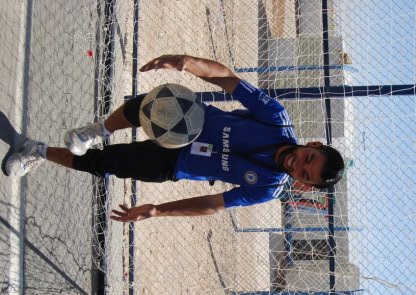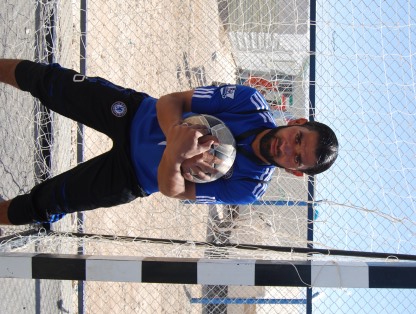Future professional footballers in a refugee camp
Coach Mohammad Ali Abu Horan’s team succeeds, even though the equipment is terrible, and many of the boys have to play barefooted or in their socks.
The coach of the football school for Syrian youth in Zaatr refugee camp, Mohammad Ali Abu Horan, wishes that his players would get shoes and more footballs. Abu Horan himself played football in several league teams in Syria. Based on his experience, he believes that there are future pros among the refugee youth.
Mohammad Ali Abu Horan, 26, started playing when he was eight. The sport had

Mohammad Ali Abu Horan played football at a league level in Syria for over four years and studied physical education in the university. The war destroyd that and forced him to leave his country.
become familiar through television and from the side of the field. There even were footballers in his family.
Abu Horan got to play as a pro for four years. The war ended his career.
Abu Horan played for two years in Al-Ittihad-team in Aleppo, and after that for two years in Ashaala-team in Daraa, Southern Syria. He also studied physical education in the university, but didn’t have time to graduate.
Abu Horan has been living in Zaatr with his wife for a year now. They recently became parents, when a baby girl was born to them.
“I thought my life was over”
In the beginning, Abu Horan made a living by selling spices in a small booth. Now, he is working for Finn Church Aid in Zaatr refugee camp in Northern Jordan and coaches boys’ football club together with another coach, Ali Abd Al-Razaq Majaresh.
“When I came to Zaatr and saw the camp, I thought my life was over. But then I found out how many organisations offer sport activities and though maybe it was good that I came here”, Abu Horan says.
“Maybe Zaatr will make me famous.”
Abu Horan already is well known in the camp, because FCA’s boys’ teams have brought back medals from two football tournaments, organized by the Union of European Football Association UEFA at Zaatr. A couple of weeks ago the team brought back gold in the camp’s own tournament.
All the players don’t have shoes
There are between 75-100 young men in the two football groups in the camp that Finn Church Aid has. The younger are between 12 and 16, and the older between 17 and 24. They practice five times a week for two hours, in the asphalt field provided by Finn Church Aid. In addition, UEFA sets up evening practice twice a week.
Because the majority of the players have fled the war in a hurry, or have already outgrown their clothes in the camp, they play football in their jeans, and in their socks, or even barefooted.
They also have shortage of footballs, because they tend to break when hitting the barbwire fence.

”When I came to Zaatr and saw the camp, I thought my life was over”, was Abu Horan’s first impression on Jordan.
Therefore, Abu Horan wishes for more footballs, shoes, sport clothes and other equipment for his players. And the asphalt field is not the best of fields for football.
Abu Horan wishes that foreign teams would come to Zaatr and meet the players.
“If only the best of them got a chance to play abroad, where the conditions are better” he hopes.
One dream exceeds even football
Even though the equipment is inadequate, the players are very enthusiastic about the sport. Abu Horan tells how the teams played in the March tournament set up by UEFA tirelessly for nearly seven hours. Both the FCA teams got silver from the tournament. In June, that silver turned into gold medals.
“They knew that if they won, they’d receive medals”
Abu Horan wishes for success and fame for himself and his team. Even more he wishes to return to Syria and see his relatives.
Text : Terhi Kinnunen
Photos: Terhi Kinnunen and Johanna Norrdahl.